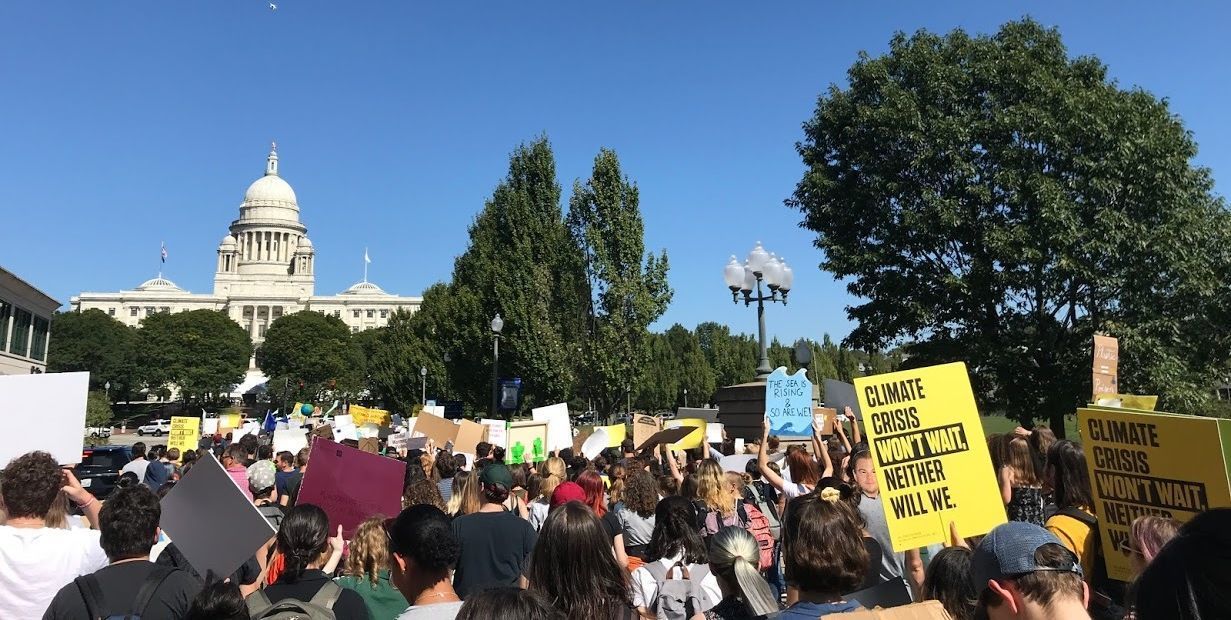
Published November 29, 2020
Organizing To Meet The Climate Crisis
Audubon Report Editorial by Meg Kerr, Senior Director of Policy
We are in a time of climate crisis, and yet lately, I have been feeling hopeful. Across the globe, young people are becoming climate change leaders, doing the hard work of organizing. I am in awe of Greta Thunberg, the 16-year old leader of the climate change Sunrise Movement, channeling her anger about her endangered future towards activism on an international scale. On Friday, September 20, I joined my Audubon colleagues and about 1,000 others to march in the Sunrise Movement’s climate strike. The crowd of mostly young people gathering in Burnside Park received encouragement from beeping horns and yells of support from people passing by. Will this swell of outrage from young people who will live with decades of careless decisions change the conversation at the Rhode Island State House this year?
I am hopeful, but I share Greta Thunberg’s skepticism of political support for environmental change. What we see too often is platitudes or changes so incremental that they do nothing to alleviate the problems we are facing. Here in Rhode Island, the climate crisis seems to have very little impact on daily decisions made by our elected leaders and our government officials. Even when faced with a crisis like the unprecedented number of mosquito borne EEE infections this summer, our government focused entirely on the immediate response (aerial spraying), while failing to raise alarms about the underlying temperature and precipitation changes that mean more mosquitoes in the coming years. Where is the long-term planning and invitation for public engagement on how mosquitoes can best be managed? Where are the linkages to other problems of climate change? I would like to see a policy conversation about bees and beneficial insects and how we protect them while we manage the disease carrying vectors.
We make decisions every day in our cities and towns throughout the state that should be taking climate impacts into account. Development decisions must consider the rising water predicted for the not too distant future. The Coastal Resources Management Council has created an excellent suite of tools to help visualize sea level rise and its impacts on the state. Their on-line Storm Tools mapping product allows anyone to visualize 1–12 feet of sea level rise and storm surge and its impact on properties. When I read about proposals for a bus tunnel in Kennedy Plaza or the Fane tower, a 46-story residential high rise under review for construction in the I-195 land, I wonder what plans are being made for making these properties resilient to storms and rising seas.
Audubon’s Issues Committee has agreed that the climate crisis is the top priority for our 2020 legislative work. We will be supporting a suite of bills that address the most pressing climate priorities.
We will work to make our climate goals mandatory and enforceable economy wide. We will push to protect our critical forest resources. While we support the rapid deployment of renewable energy in preferred locations, we will act to protect forests for their value as wildlife habitat, climate cooling properties, and greenhouse gas absorption. We will be supporting the 2020 Green Bond and will advocate to ensure that it includes funds for resilience and land protection including forests. I know that we will face an up-hill battle at the statehouse where our leaders make environmental issues, even climate change, a low priority. But we will continue to advocate in the spirit of the Sunrise Movement: this is not about environmentalists vs. politicians, this is about all of us as citizens of this state. This is not about immediate development plans or budgetary growth, this is about what kind of world we plan to leave to the next generation. Surely, we can all unite in hope for them.

















